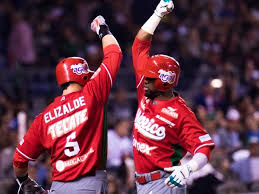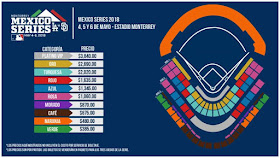 |
| Tabasco Olmecas team president Juan Luis Dagdug |
The Villahermosa-based team staggered through a moribund season last year, finishing a Liga-worst 38-69 on the field to come in 26 games out of first place in the mediocre South Division. The poor showing was reflected in the box office at Parque Centenario 27 de Febrero, where only 71,829 souls passed through the turnstiles over 50 dates for an average of just 1,437 per opening. The ballpark itself was plagued by electrical problems throughout the campaign, with power outages a common occurrence, which didn't help attendance at all. The nadir of the Olmecas season came Sunday, July 2, when only 178 were in the stands to witness a 5-0 loss to Monterrey. It was that kind of year in Tabasco.
Former team chairman Carlos Jose Dagdug, who resigned from his club duties after the 2017 schedule was completed, told Tabasco Hoy last fall that it would take about 40 million pesos (approximately 2.2 million US dollars) to field a competitive team in Villahermosa this year under manager Alfonso "Houston" Jimenez. The former MLB shortstop had yet to convene training camp for the squad as of late last week, however, as rumors float that cash shortages in the front office have led to the delay. Whatever the cause, the situation mirrors the late starts by newcomers Durango and Leon last year, with both teams playing on the road for the first month of the season while their own ballpark upgrades were being performed.
One positive bit of news coming out of Tabasco is that renovations to Parque Centenario 27 de Febrer, which turns 54 Tuesday, are underway and hoped to be mostly completed when the regular season opens in late March. LMB president Javier Salinas toured the facility last week with new team president Juan Luis Dagdug (Carlos' brother) as part of a visit to the troubled franchise, calling the Olmecas one of the "pillars" of the Mexican League due to their continuous play since starting in 1977. Renovations will include a paint job, restroom upgrades, remodeled locker rooms maintenance to the grandstand roof. Hopefully a call to an electrician is also on the agenda.
Acereros undergoing makeover for 2018 season
 |
| Former Monclova SS Amadeo Zazueta (now with Leon) |
Never the type of person to sit idly even in the best of times, Benavides was expected to rearrange the landscape of his preferred hometown team. He started with his manager, Jorge Luis Loredo, who took over the team after the Wally Backman experiment failed and steadied the ship before the Acereros' ignominious postseason exit. Loredo was not rehired and will coach for Houston Jimenez in Tabasco this year while former MLB and LMB catcher Dan Firova was hired to manage in Monclova.
A six-player "trade" with Puebla shortly after the season ended netted shortstop Alberto Carreon, third baseman Issmael Salas and catcher Cesar Tapia while the Acereos only gave up catcher DJ Dixon and pitchers Julio Felix and Romario Gil, but Salas has already been returned to Puebla without ever suiting up for the Steelers. Then shortstop Amadeo Zazueta, who played in the All-Star Game at Campeche and had a terrific year at the plate with a .341 batting average, was shipped to Leon without a player coming in return from the Bravos.
Finally, Monclova worked a deal with Tijuana last Friday in which speedy centerfielder Justin Greene and solid right-handed pitcher Hector Galvan were sent to the Toros in exchange for reserve outfielder Chris Valencia and righty pitchers Jordan Aboites and Edwin Quirarte, a deal that at first glance seems to clearly favor the defending champions. Another head-scratching transaction was the importing of former MLB second baseman Jemile Weeks, who hit .303 for Oakland in 2011 but has otherwise been a bit of a journeyman, appearing for four big league teams between 2011 and 2016. What Firova will do with Weeks is uncertain, given that he already has arguably the best Mexican second sacker in the game on his roster in Manny Rodriguez.
Whether all the personnel moves result in Monclova winning the city's first LMB pennant since the Acereros made their debut in 1974 (Benavides' grandfather was owner) remains to be seen, but Firova himself may need a scorecard to keep track of who's playing for him on any given night.
Venados' owner willing to host 2019 Caribbean Series, if needed
 |
| Artist's conception of remodeled Mazatlan ballpark |
Venados owner Antonio Toledo tells Puro Beisbol's Fernando Ballesteros that if Venezuela has to drop out as CS host, "The Dominican Republic would be the second option but in case they're not in condition to take over, we could get in." After years of jockeying for an all-new ballpark north of the city's tourist zone, it was decided instead to completely renovate Estadio Teodoro Mariscal, which has been home to the Venados since its 1962 opening. While various maintenance and repair projects (including a 2000 seating expansion) have been performed at the 15,000-seat ballpark, which sits between the Zona Dorado to the north and downtown Mazatlan to the south, this is the first-ever major overhaul of the facility. "Our remodeled stadium should be ready by the beginning of October," Toledo told Ballesteros, "but if it's not, it's possible we can play a few series on the road to start the season."
Mazatlan is one of five LMP cities that typically rotate as Caribbean Series hosts, along with Mexicali, Hermosillo, Culiacan and now Guadalajara. The tourney itself historically has rotated between Mexico, Venezuela, Puerto Rico and the Dominican Republic over the past four decades, although Miami was the site for two ill-fated attempts to bring the CS to the United States in the early 90's. Mazatlan has hosted the tournament four times (1978, 1985, 1993 and 2005), with the Venados becoming the only host team to win the CS in front of its own fans in 2005.
Barquisimieto is scheduled to host the Caribbean Series in 2019, followed by San Juan, Puerto Rico in 2020 and Mazatlan in 2021. There has been talk of Havana, Cuba being a potential site, although the needed infrastructure may not yet be in place to handle the influx of fans from other countries, while both Panama and Colombia have also been mentioned as COPABE president Jose Manuel Puello seeks to expand the event to other nations. However, Mexico has proven to be the most supportive of the participating countries since the turn of the century, so it would not be wise to count out Mazatlan two years early...just in case.











